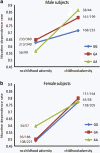Childhood adversity increases risk for nicotine dependence and interacts with α5 nicotinic acetylcholine receptor genotype specifically in males
- PMID: 22012472
- PMCID: PMC3260970
- DOI: 10.1038/npp.2011.240
Childhood adversity increases risk for nicotine dependence and interacts with α5 nicotinic acetylcholine receptor genotype specifically in males
Abstract
The relative importance of specific genetic and environmental factors in regulating nicotine dependence (ND) risk, including the effects on specific forms of childhood adversity on smoking risk, have been understudied. Genome-wide association studies and rodent models have demonstrated that the α5 nicotinic acetylcholine receptor gene (CHRNA5) is important in regulating nicotine intake. Childhood adversity increases the methylation level of the CHRNA5 promoter region in European Americans (EAs), an effect that was observed only in males (Zhang et al, submitted for publication). In view of this potential sex difference in the effects of early life experience on smoking, we investigated the presence of a sex-specific gene-by-environment effect of this marker on ND risk. A nonsynonymous SNP in CHRNA5 previously associated to ND and several related traits, rs16969968, was genotyped in 2206 EAs (1301 men and 905 women). The main and interactive effects of childhood adversity and rs16969968 genotype on diagnosis of ND and ND defined by dichotomized Fagerstrom test for ND (FTND) scores were explored. Men and women were analyzed separately to test for sex differences. Childhood adversity significantly increased ND risk in both sexes, and the effect in women was twice than that in men. Significant interactive effects of childhood adversity and rs16969968 genotype were observed in men (ND: OR=1.80, 95% CI=1.18-2.73, P=0.0044; FTND: OR=1.79, 95% CI=1.11-2.88, P=0.012). No interaction was found in women. This study provides evidence of a sex-specific gene × environment effect of CHRNA5 and childhood adversity on the risk for ND.
Figures


Similar articles
-
Nicotine dependence in an isolated population of Kashubians from North Poland: a population survey.BMC Public Health. 2015 Feb 4;15:80. doi: 10.1186/s12889-015-1455-5. BMC Public Health. 2015. PMID: 25652844 Free PMC article.
-
Combined genetic influence of the nicotinic receptor gene cluster CHRNA5/A3/B4 on nicotine dependence.BMC Genomics. 2018 Nov 20;19(1):826. doi: 10.1186/s12864-018-5219-3. BMC Genomics. 2018. PMID: 30453884 Free PMC article.
-
A twin association study of nicotine dependence with markers in the CHRNA3 and CHRNA5 genes.Behav Genet. 2011 Sep;41(5):680-90. doi: 10.1007/s10519-011-9476-z. Epub 2011 Jul 12. Behav Genet. 2011. PMID: 21748402 Free PMC article.
-
Contribution of Variants in CHRNA5/A3/B4 Gene Cluster on Chromosome 15 to Tobacco Smoking: From Genetic Association to Mechanism.Mol Neurobiol. 2016 Jan;53(1):472-484. doi: 10.1007/s12035-014-8997-x. Epub 2014 Dec 5. Mol Neurobiol. 2016. PMID: 25471942 Review.
-
From men to mice: CHRNA5/CHRNA3, smoking behavior and disease.Nicotine Tob Res. 2012 Nov;14(11):1291-9. doi: 10.1093/ntr/nts106. Epub 2012 Apr 27. Nicotine Tob Res. 2012. PMID: 22544838 Free PMC article. Review.
Cited by
-
The genetics of substance dependence.Annu Rev Genomics Hum Genet. 2012;13:241-61. doi: 10.1146/annurev-genom-090711-163844. Epub 2012 Jun 11. Annu Rev Genomics Hum Genet. 2012. PMID: 22703173 Free PMC article. Review.
-
Passive Response to Stress in Adolescent Female and Adult Male Mice after Intermittent Nicotine Exposure in Adolescence.J Addict Res Ther. 2013 Apr 23;Suppl 6:007. doi: 10.4172/2155-6105.S6-007. J Addict Res Ther. 2013. PMID: 24619539 Free PMC article.
-
Unpacking the impact of adverse childhood experiences on adult mental health.Child Abuse Negl. 2017 Jul;69:10-19. doi: 10.1016/j.chiabu.2017.03.016. Epub 2017 Apr 15. Child Abuse Negl. 2017. PMID: 28419887 Free PMC article.
-
Genetic influences on nicotinic α5 receptor (CHRNA5) CpG methylation and mRNA expression in brain and adipose tissue.Genes Environ. 2015 Oct 1;37:14. doi: 10.1186/s41021-015-0020-x. eCollection 2015. Genes Environ. 2015. PMID: 27350810 Free PMC article.
-
Nicotinic receptors in non-human primates: Analysis of genetic and functional conservation with humans.Neuropharmacology. 2015 Sep;96(Pt B):263-73. doi: 10.1016/j.neuropharm.2015.01.023. Epub 2015 Feb 7. Neuropharmacology. 2015. PMID: 25661700 Free PMC article. Review.
References
-
- Anda RF, Croft JB, Felitti VJ, Nordenberg D, Giles WH, Williamson DF, et al. Adverse childhood experiences and smoking during adolescence and adulthood. JAMA. 1999;282:1652–1658. - PubMed
-
- Blumberg SJ, Luke JV.2010Wireless Substitution: Early Release of Estimates from the National Health Interview Survey, July–December 2009 CDC/National Center for Health Statistics; June 2011. Available from: : http://www.cdc.gov/nchs/nhis.htm .
-
- Carmelli D, Swan GE, Robinette D, Fabsitz R. Genetic influence on smoking—a study of male twins. N Engl J Med. 1992;327:829–833. - PubMed
-
- Carmody TP. Affect regulation, nicotine addiction, and smoking cessation. J Psychoactive Drugs. 1989;21:331–342. - PubMed
Publication types
MeSH terms
Substances
Grants and funding
LinkOut - more resources
Full Text Sources

